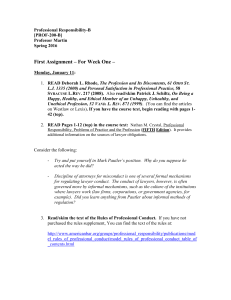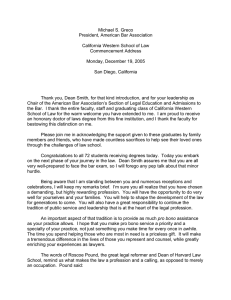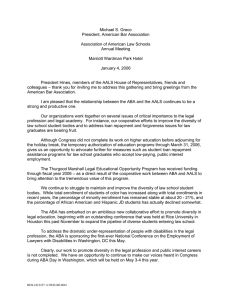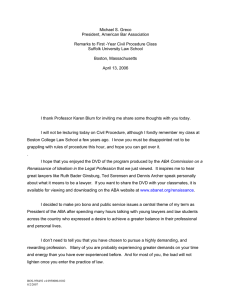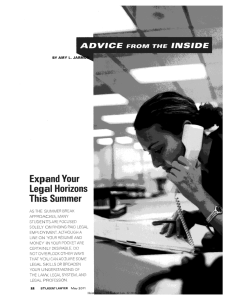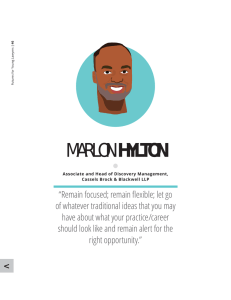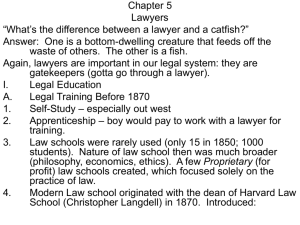Michael S. Greco President-Elect, American Bar Association
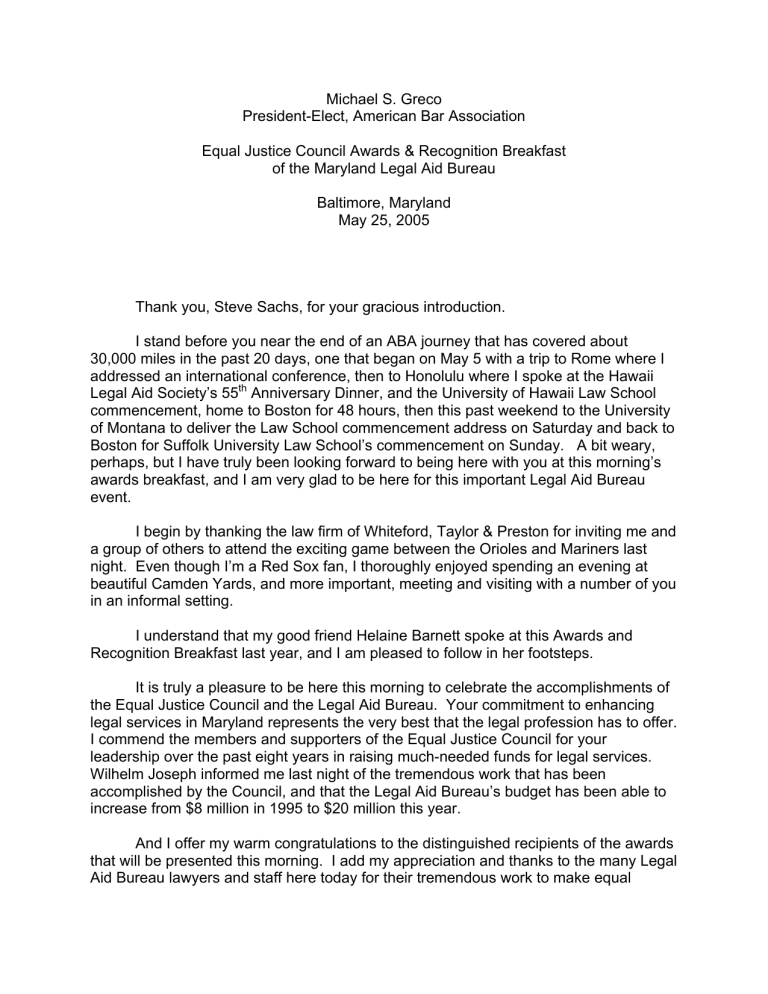
Michael S. Greco
President-Elect, American Bar Association
Equal Justice Council Awards & Recognition Breakfast of the Maryland Legal Aid Bureau
Baltimore, Maryland
May 25, 2005
Thank you, Steve Sachs, for your gracious introduction.
I stand before you near the end of an ABA journey that has covered about
30,000 miles in the past 20 days, one that began on May 5 with a trip to Rome where I addressed an international conference, then to Honolulu where I spoke at the Hawaii
Legal Aid Society’s 55 th Anniversary Dinner, and the University of Hawaii Law School commencement, home to Boston for 48 hours, then this past weekend to the University of Montana to deliver the Law School commencement address on Saturday and back to
Boston for Suffolk University Law School’s commencement on Sunday. A bit weary, perhaps, but I have truly been looking forward to being here with you at this morning’s awards breakfast, and I am very glad to be here for this important Legal Aid Bureau event.
I begin by thanking the law firm of Whiteford, Taylor & Preston for inviting me and a group of others to attend the exciting game between the Orioles and Mariners last night. Even though I’m a Red Sox fan, I thoroughly enjoyed spending an evening at beautiful Camden Yards, and more important, meeting and visiting with a number of you in an informal setting.
I understand that my good friend Helaine Barnett spoke at this Awards and
Recognition Breakfast last year, and I am pleased to follow in her footsteps.
It is truly a pleasure to be here this morning to celebrate the accomplishments of the Equal Justice Council and the Legal Aid Bureau. Your commitment to enhancing legal services in Maryland represents the very best that the legal profession has to offer.
I commend the members and supporters of the Equal Justice Council for your leadership over the past eight years in raising much-needed funds for legal services.
Wilhelm Joseph informed me last night of the tremendous work that has been accomplished by the Council, and that the Legal Aid Bureau’s budget has been able to increase from $8 million in 1995 to $20 million this year.
And I offer my warm congratulations to the distinguished recipients of the awards that will be presented this morning. I add my appreciation and thanks to the many Legal
Aid Bureau lawyers and staff here today for their tremendous work to make equal
access to justice a reality for so many Marylanders. I want to give special thanks and acknowledgement to the following individuals who are here this morning:
• Chief Judge Robert Bell of the Maryland Court of Appeals;
• Andrew Jay Graham, Chair of the Equal Justice Council;
• Decatur Miller, past Chair of the Council;
• Robert Gonzales, ABA State Delegate from Maryland, and member of the
Bureau’s Board of Directors;
• Herb Garten, member of the Board of the Legal Services Corporation who has been very active in the ABA on legal services issues;
• Susan Ehrlichman, Director of the Maryland IOLTA program;
• Debra Gardner, attorney with the Public Justice Center and lead counsel in Frase v. Barnhart (case seeking to establish a civil right to counsel in
Maryland); and,
• the irrepressible Wilhelm Joseph, Director of the Maryland Legal Aid
Bureau, who kindly met me at the airport last evening.
I want to take a moment to note the recent death of a true leader in the field of access to justice who was known to many of you here – Denis Murphy. Denis chaired the ABA Lawyer Referral Committee in the mid-1990s and served in the ABA House of
Delegates as a representative of the Columbus, Ohio, Bar Association. His tireless work to promote equal justice for all in Ohio, Maryland, and throughout the nation serves as an inspiration to us all. His presence will be missed, but his work will live on.
--------------------------------------------------------
Since 1911, the Maryland Legal Aid Bureau has worked tirelessly to expand access to justice for low-income clients. Your work on behalf of those who are most in need of legal assistance has not only vindicated legal rights, but has also given the priceless gifts of hope and dignity. The importance of ensuring access to legal services for the poor cannot be overstated. As all of you know, the ability to address civil legal needs with the help of a qualified lawyer can make the difference between stability and poverty, between hope and despair.
In the areas of education, immigration, housing, health, employment, and domestic violence, to name several, legal services and pro bono representation represent a lifeline to those who are most in need. Lawyers and programs providing these services help to ensure that children receive the education to which they are legally entitled, including special assistance.
You help immigrants navigate a complex system that they may not understand, while keeping families together and protecting refugees from dangers they would face if deported to their home countries.
You enforce tenants’ rights to livable housing conditions and ensure that due process is afforded in eviction proceedings and other housing-related disputes.
2
You ensure that people—especially children—obtain necessary medical attention and are treated fairly by doctors, HMO’s, insurance providers, and state agencies.
You help to ensure safe workplaces and provide redress for discrimination and unfair treatment by employers.
And you help victims of domestic violence obtain critical legal protections and support for children.
For doing this, and so much more, the providers and supporters of legal services in Maryland and across the country deserve the thanks and appreciation of the entire organized bar, and indeed of the entire nation.
-------------------------------------------------------
I want to share some thoughts with you this morning about the highest purposes of the practice of law, and the work of the American Bar Association to advance them.
Public service work, pro bono representation, and provision of legal services to people of limited means are core components of our pursuit of equal justice under law.
They are our most solemn responsibilities as lawyers, and they provide the greatest opportunities to affect positive social change.
Hammurabi wrote 1700 years before Christ, in the first written code of law, that the purpose of the law is to protect the powerless from the powerful. I believe that the noblest purpose of being a lawyer today continues to be to protect the powerless from the powerful.
I believe that the joy of being a lawyer comes from using our legal training to help human beings in need, and to help improve society for the benefit of all, regardless of their economic or social status. The joy comes from doing well, but also doing good.
The ideal of true social justice is one that lawyers strive for each day.
I was especially pleased to be invited to share a few thoughts with you today because I believe that two of my primary initiatives as President of the American Bar
Association will speak to your hopes and expectations for the future of the legal profession.
Goal X of the American Bar Association is: To preserve and enhance the ideals of the profession . . . and its dedication to public service.
Like many, if not all, of you, I was drawn to the law out of a desire to serve the public, to solve problems, and to help those with limited resources who have nowhere to turn. This altruistic spirit of service to others has defined our profession from the earliest days of our nation and it continues to do so today. But we face new challenges
3
and pressures in the practice of law that have made it more difficult for many in the bar to fill the time-honored role of lawyer as public citizen.
It is in this spirit of public service that I am calling for a “Renaissance of Idealism” in our profession: a reaffirmation of the core values and ethical principles that guide our profession. Working with all of you and with lawyers throughout the nation, I want to help reinvigorate and reenergize this commitment to pro bono and public service work— and then nurture and expand it for generations of lawyers to come.
In order to realize this goal, lawyers must strike a balance in their lives and practices. The key to that balance is time – freeing up time for lawyers to perform public service and pro bono work – in law firms, in government offices, in any setting where a lawyer practices law.
I will commit the resources of the ABA to make the case with decision-makers in
America’s law offices that it is in the best interest of the lawyer, the lawyers’ place of employment, the profession, and the American people, that we free up time. Time to help people in need; to participate more fully in our communities; and to give lawyers greater fulfillment in their professional lives; time to enable lawyers to fulfill our historical and noble role as Public Citizen.
As part of this presidential initiative, the ABA will compile a guide to “best practices” in pro bono and public service work, and make it available to legal employers throughout the nation. We will also work to develop alliances with segments of the bar and non-legal organizations to develop a series of projects to enhance pro bono and public service opportunities for lawyers.
And we are working with the American Bar
Foundation to develop an updated statement on professional values and a history of lawyer involvement in communities.
All of these products and efforts are designed to support your efforts – at the state and local levels – to ensure access to equal justice for all.
In the coming month I will appoint a distinguished ABA Commission on the
Renaissance of Idealism in the Legal Profession to help me implement this initiative.
The outcome, I am certain, will be a challenge to the profession – a challenge that will inspire us to make changes to benefit all lawyers, the profession, and the American people.
The need for a “Renaissance of Idealism” in the profession has never been greater. As everyone in this room knows all too well, the demand for legal services, pro bono representation, and other legal assistance for those who are most in need continues greatly to outpace the resources available.
It has been reliably documented that between 70 and 80 percent of the legal needs of poor people in this nation go unaddressed year after year. Despite our best
4
efforts, we have not made significant strides to serve the legal needs of those whom poverty drags down and keeps down.
We must continue to advocate for increased funding of the Legal Services
Corporation, the principal national funding source for all our local legal aid programs.
LSC now receives only $331 million. If the LSC appropriation had not increased, but had merely kept up with inflation since 1995, the LSC would now be receiving $490 million. So we can see how far behind it has fallen.
The ABA also encourages state and local bars to aggressively seek out other sources of funding for legal services. Innovative approaches are being explored around the country such as the use of cy pres funds left over from class action lawsuits – I note that the Equal Justice Council has a cy pres committee.
It is now evident that the problem of addressing unmet legal needs in our country is larger than the legal profession can solve by itself. Our nation lags far behind other major industrialized countries of the world in providing meaningful help to poor people with legal problems. And so I want to begin a national dialogue on how the problem can be solved. I do not expect that it can be solved in one year, or two, or three, but it is critically important that we now commit to finally doing something about it.
I am pleased to announce that I will appoint an ABA Task Force to examine efforts to expand access to justice – particularly at the state and local levels. This Task
Force will also carefully consider the right to counsel in serious civil legal matters. I’m sure that this Task Force will closely study the tremendous efforts of Stephen Sachs,
Debra Gardner, and others in the Frase v. Barnhart case, which sought to establish a civil right to counsel in Maryland. I also hope that they study the thoughtful concurring opinion joined in by Chief Judge Bell in the Frase case.
The U.S. Supreme Court in 1962 in Gideon v. Wainwright recognized, and our nation has recognized, that under our Constitution, an indigent caught up in the criminal justice system must be provided a lawyer before he or she may be imprisoned behind bars of steel. But 43 years after Gideon we have not yet recognized such a right for poor people facing equally serious civil legal problems – problems that imprison them in poverty and prevent them from becoming productive members of society.
Our laws and jurisprudence lag far behind those of other Western nations in this regard. The Constitutions of the Netherlands, Italy and South Africa, to name only several, explicitly recognize a right to counsel for the indigent in civil cases when substantial injustice would otherwise result. In addition, beginning in the late 1800s, most other Western nations recognized some form of right to counsel in civil cases through legislation or court decisions.
When one compares our expenditure of public resources to address the legal needs of the poor in the United States with systems in place in other Western, industrialized nations, we are shamed. California Appeals Court Justice Earl Johnson
5
has conducted extensive studies of legal aid systems internationally. He concluded that as of 1999 the least generous other industrial democracies – France and Germany – spent 2.5 times more of their gross national product than the United States did in serving the civil legal needs of lower income populations; England spent 17 times more of its GNP than the US to provide access to justice for its poorer people.
According to Justice Johnson, if the United States were to match the
French/German approach, we would be spending about $1.6 Billion annually on legal services for the poor; and if we followed England’s lead we would be spending about
$10 Billion dollars annually on legal services for the poor.
I say to you today that the time has come for us to start a serious national discussion about access to counsel for poor people, whether they are facing a serious criminal charge or an equally serious civil matter. Let me be clear – I am not talking about providing a lawyer in every situation where a poor person believes he or she has been aggrieved. But in matters where a poor person’s family, sustenance, health or housing are threatened by a legal problem, our system of justice must provide necessary legal assistance.
If we are to meet the goal of equal justice for all, such critically important assistance cannot be rationed by the teaspoonful. It should not be subject to long waiting lists, limited capacity and narrow legal aid priority lists that increasingly are based on a triage approach.
No one in our nation should have to go unassisted into court when the integrity of his or her family is at stake, when he or she and their children may be thrown out of their home, or when they may suffer other grievous harm at the hands of a system they cannot navigate or even understand on their own.
Above the doors to the United States Supreme Court building are etched the words “Equal Justice Under Law.” That eloquent statement – in this bountiful land full of hope and promise – today is hollow rhetoric to far too many in our society. It is our obligation – yours and mine – to breathe life into those words.
And so I ask you to help me reinvigorate the spirit of idealism and public service that infuses our great profession.
And I ask you to join me in engaging our nation in a new dialogue on access to justice and expanding the right to counsel, so that the promise of “Equal Justice Under
Law” finally is kept for the poorest and most vulnerable in our country.
We have a lot of work ahead of us. I take comfort in knowing of the great work that you are doing here in Maryland on access to justice issues, and of the support that you have expressed for my ABA initiatives. I look forward to working with you during my year as ABA President.
6
Thank you for your kind attention this morning.
7
